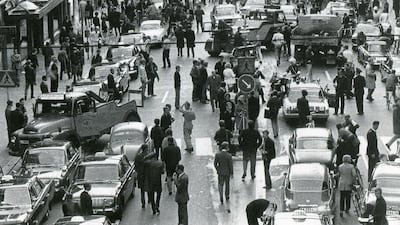The year of 1967 is remembered for many reasons, including conflict, counterculture and, in Sweden, cars switching from driving on one side of the road to the other.
In the early hours of September 3 of that year, Sweden changed from driving on the left-hand side of the road to the right. Dagen H, short for Hogertrafikomlaggningen (meaning the right-hand traffic diversion), was designed to improve traffic safety in Sweden and to bring the country’s roads in line with the rest of continental Europe.
In this part of the world, Dubai had made a similar move from left to right a year earlier, in 1966. By then, like Sweden, many of the cars using the roads in the emirates were left-hand drive. Historical accounts report few problems in Dubai after the changeover, save for some short-lived confusion on its busier roads, but it is also fair to say that the roads were a lot quieter then than they are today.
The change in Sweden, however, was a shift that involved the entire country rather than a single city. The late Olof Palme, who was Sweden’s communications minister in 1967 and later twice served as prime minister, said that the switch represented a “large change” to life in the country – and it was, involving a literal uprooting of road signs across the nation to point them in a different direction.
The event is, perhaps, best remembered globally now by a set of black-and-white prints, showing cars shifting from one side of the road to the other on the morning of September 3, 1967, and pedestrians being somehow magnetically drawn from the pavements onto the thoroughfares of Stockholm. According to Annika Hipple’s Real Scandinavia online resource, Time magazine’s correspondent described the events of Dagen H as a “brief but monumental traffic jam”.
These pictures are a people watcher’s and car spotter’s dream, a genuine window into Sixties Sweden and how people used to live their lives, but they also give up something else: that sense of bewilderment and confusion humans are programmed to feel when a sudden change to routine occurs or is imposed upon them.
My eyes have returned many times to those black-and-white photographs in the lead up to the weekend switch that happens for the first time proper in the UAE this Friday.
This follows the announcement last month that the weekend would move to Saturday and Sunday from the beginning of 2022 and that public sector workers will change to a four-and-a-half-day week. Friday prayers will start at 1.15pm to accommodate the new timings. Many private sector firms will make the switch, too, and all of us will be making adjustments one way or another.

This follows the previous switch in 2006 when the weekend moved in the UAE from Thursday and Friday to Friday and Saturday.
If last weekend, which wrapped new year celebrations into a three-day break, was the first time that the weekend fell on a Saturday and Sunday, the weekend ahead of us represents the moment when we fully break the ties of the Friday and Saturday weekend and, effectively, switch over to the other side of the road.
It will be an interesting journey. These are both exciting and bewildering times.
In common with many people, I suspect, my life over the past few days has been punctuated by changing days on calendars, shifting appointments and commitments forward by a day and wondering how many things I may have forgotten to allow for along the way. The logistics of our lives are changing.
The first Friday of school – even in distance learning mode, which it will be for most students this week – will be an unusual experience for many school pupils.

For office workers, the days of trotting out the words “don’t call me on a Friday” will still hold true for some – Sharjah has adopted a three-day weekend – although for others that phrase will need the addition of the word “afternoon” to reflect the new beginning of the weekend.
So, it will be a period of adaptation and, perhaps, reflection. While we may lose the point of difference with the western world that was the old Friday-Saturday weekend, our new routine brings us into line with some in the region and moves us out of line with others.
Overall, we will gain far more than we lose. The weekend switch is anticipated to be a boon for hospitality, retail and tourism, as well as, potentially, for work-life balance. As Nancy Gleason of New York University Abu Dhabi wrote previously for these pages, the idea of an eight-hour day, five days a week working life has become outmoded. The toll of the past two years of the pandemic has made many workers profoundly aware of that fact both positively and negatively. The weekend shift and the change to the business day on Friday are moving us down a progressive path, economically and socially.
The benefits are clear, but that won’t stop some of us being a little bewildered on Friday morning, as workplaces open and schools go into class for the first time. Our own Dagen H will soon be upon us.


